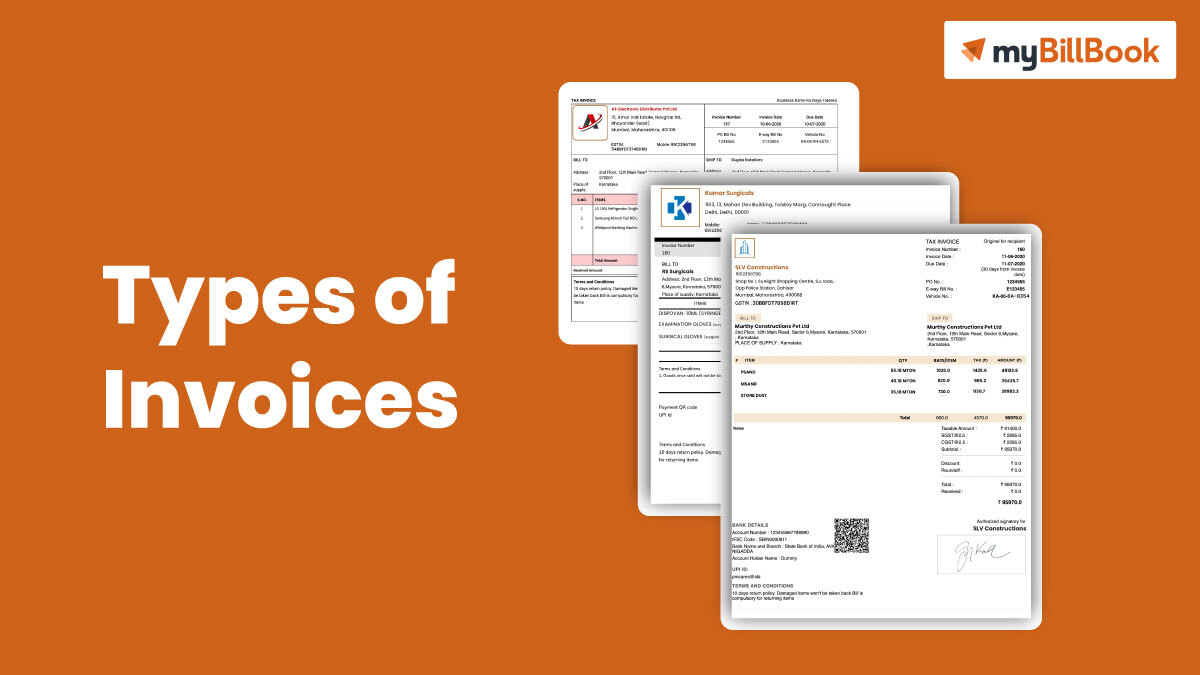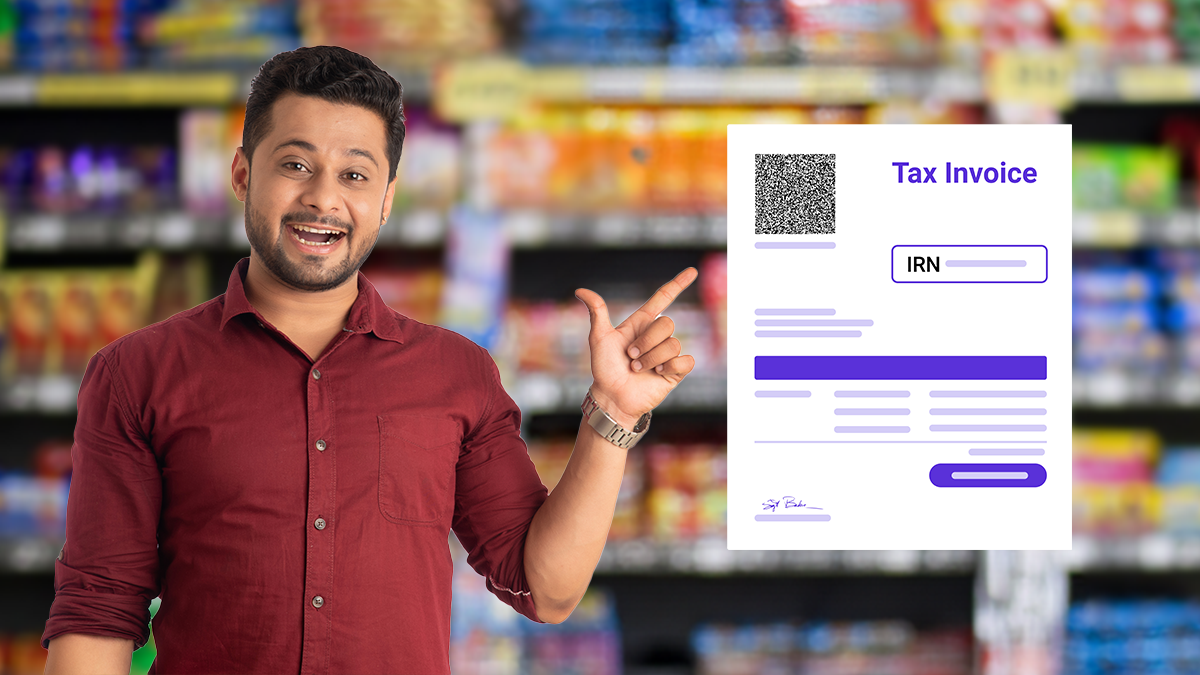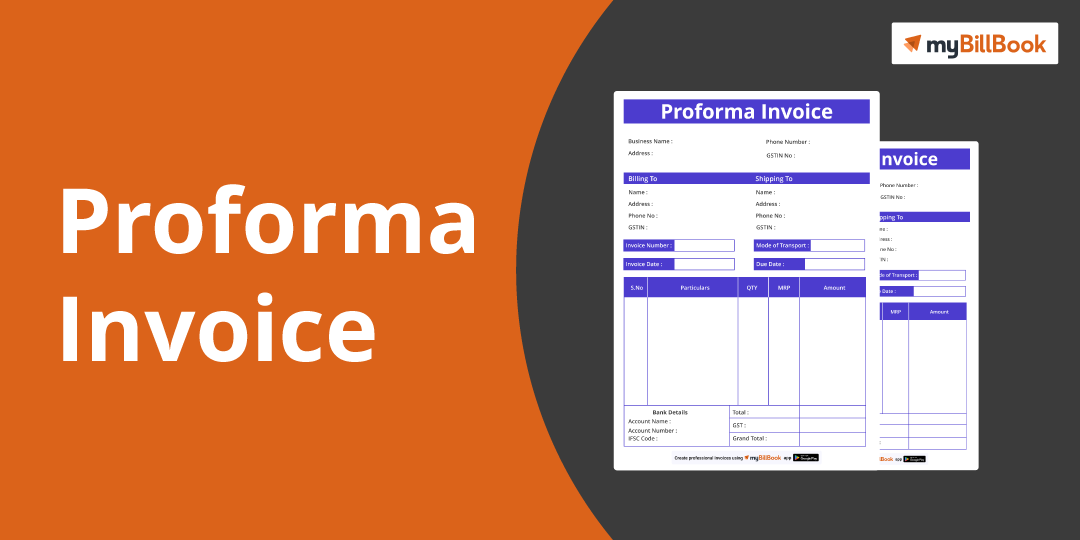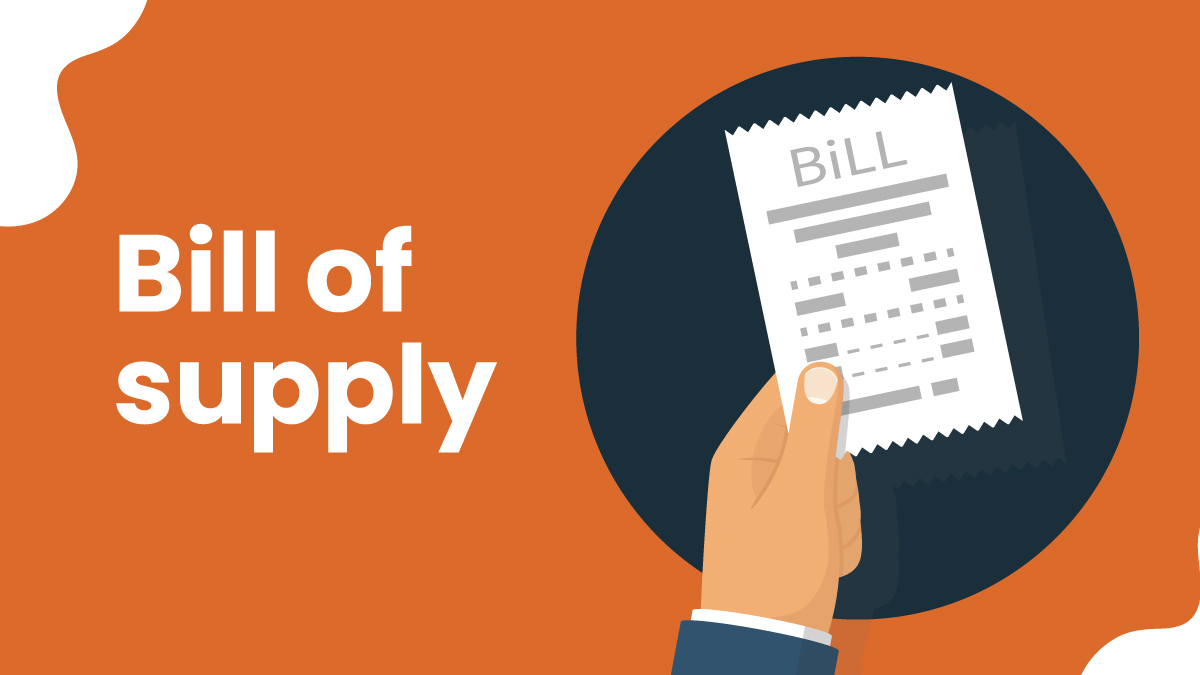Types of Invoices You Must Know
Different types of invoices are used for different business transactions. Each type of invoice has its own specific purpose. Most invoices must comply with regulatory requirements set by the Goods and Services Tax (GST). Listed here are the common types of invoices regularly used in most business transactions.
List of Different Invoice Types
- Sales Invoice
- Tax Invoice or GST Invoice
- Bill of Supply
- Credit Notes
- Debit Notes
- Delivery Challan
- e-Invoice
- Proforma Invoice
- Commercial Invoice
- Purchase Order Invoice
- Receipt Voucher
- Refund Voucher
- Payment Voucher
- Supplementary Invoice
- Timesheet Invoice
- Recurring Invoice
Types of Invoices – Definition & Meaning
Sales Invoice
A sales invoice, simply called an invoice, is a document issued by a buyer to request payment from the seller for goods or services provided. It is typically issued by businesses that are not registered under any tax laws like GST.
A sales invoice typically includes fields like sale date, invoice number, product/service descriptions, price, and total bill amount. The format of a sales invoice is not fixed. Businesses are free to choose a sales invoice format of their choice.
A sales invoice is crucial for record-keeping and also helps track sales and manage accounts receivable.
Tax Invoice or GST Invoice
The GST law refers to invoice as ‘Tax Invoice’ under section 31 of the CGST Act, 2017. According to the Act, all GST-registered businesses must issue a tax invoice or GST Invoice for every sale of goods or services. Therefore, a tax invoice is an invoice generated by a businesses registered under GST. The invoice must be issued for all the sales and supplies (taxable) made by the supplier.
The GST law has recommended a standard format with all the details that must be included in a GST invoice. Businesses must adhere to these guidelines to stay compliant with GST regulations.
A GST Invoice typically includes the invoice date, invoice number, details of sellers and buyers, including their respective GSTINs, description of goods/services sold, quantity, unit price, tax rate, HSN/SAC code, and total amount.
A tax invoice is a legal document and is required to be signed or e-signed by the respective authority without which it stands void.
Bill of Supply
A bill of supply is issued by a registered seller supplying exempted goods or non-taxable goods under the GST law. Suppliers of such nature and businesses paying tax under a composition scheme must issue a bill of supply instead of a regular tax invoice.
A bill of supply is much simpler than a tax invoice and includes specific details pertaining to the supply. It includes the supplier’s name, address, GSTIN, description of the goods or services, price, and the total amount payable without any tax charged.
Credit Note
A credit note or credit memo is a document issued by a seller to a buyer acknowledging the return of goods or services. It is issued when an invoice contains errors, goods are returned, or products are found to be deficient.
GST law prescribes a standard format for issuing credit notes. Businesses must include all the mandatory fields as defined. Credit notes are important for maintaining accurate financial records and managing customer accounts.
Debit Note
A debit note or debit memo is a document a buyer creates when returning goods sold to them. It is issued when an invoice contains errors, excess goods are supplied, or goods are returned due to defects or other reasons.
A seller can also issue debit notes if the value of a final invoice increases the amount the customer owes the business. Just like for a credit note, a debit note must be issued according to the standard format as prescribed by the GST law.
Debit notes help correct the amounts and ensure accurate financial reporting. It also serves as proof of adjustment in case of any disputes that might arise in the future.
Delivery Challan
A delivery challan, also called a dispatch challan or a delivery slip, is a document created for the transportation of goods from one place to another. It is sent along with the goods shipped for delivery and contains the details of the goods being transported.
A delivery challan includes details of the goods, sender, recipient, and transport. It’s commonly used for job work, goods sent on approval, or goods returned.
The person delivering goods must make a note on the delivery challan in case there is any damage to the goods during transit. Based on this, the seller issues a credit note. The GST law specifies defined rules regarding the issue of delivery notes.
e-Invoice
e-Invoice is a digitally signed and verified document used for B2B transactions. It contains all the details, like that of a sales invoice, but is validated by the government tax portal.
The GST system mandates e-invoicing for businesses over a certain turnover threshold for real-time reporting of invoices to the GST portal.
Once the invoice is submitted to the GST network (GSTN), it checks for duplicates, validates the information and then authenticates it by assigning a unique Invoice Reference Number (IRN). It will also add a signed QR code to the e-invoice.
e-Way Bill
An e-way bill is a mandatory document required for the movement of goods valued above a specified limit as per the GST law. The person causing the movement of goods must generate an e-way bill. An e-way bill can be generated by sellers, transporters or buyers, whether or not registered under GST.
e-Way bills can be generated on the government’s e-way bill portal by submitting the required details. Once submitted, a unique e-way Bill Number (EBN) is allocated to the shipment and the same can be accessible by the seller/supplier, buyer/recipient, and the transporter.
Proforma Invoice
A proforma invoice is a preliminary invoice that is issued before generating an actual invoice. It includes the price estimates of the goods or services that the seller has agreed to deliver. Unlike a regular invoice, a proforma does not demand payment. Instead, it helps buyers make decisions and budget for the purchase.
A proforma invoice format typically includes product details, quantity and price, delivery date, and the shipping address.
Once the buyer receives the proforma invoice, he either sends a purchase order or a letter of credit to the seller.
Commercial Invoice
A commercial invoice is a legal document used in international trade to record the export transaction between a buyer and a seller. A business issues a commercial invoice for their global products sold via exports to the importers. It is typically used for calculating customs duties and taxes and hence is required for customs clearance.
A commercial invoice contains details about the goods being exported, their value, quantity, packaging format and destination details.
Purchase Order Invoice
A purchase order invoice or PO is a document created and sent by the buyer to the seller detailing the goods or services he wants to purchase along with their quantities. This type of invoice is crucial for maintaining clear communication and accurate records between buyers and sellers.
The purchase order invoice typically includes the purchase order number, seller and buyer’s details, description of goods or services, expected delivery date and others.
Receipt Voucher
A receipt voucher is issued by a registered seller upon receiving an advance payment for any supply of goods or services. It acknowledges the receipt of the money and includes details such as the amount received, the payer details, and the purpose of the payment.
Also known as a retainer invoice, the receipt voucher is prescribed by the GST law. Accordingly, a supplier of services must calculate the GST on the advance received and deposit it with the government. This voucher acts as proof that payment has been received.
Refund Voucher
A refund voucher is generated when a seller fails to supply the goods after generating a receipt voucher or receiving an advance payment.
A refund voucher includes details of the original transaction, the amount being refunded, and the reason for the refund.
As per the GST law, a refund voucher must be issued along with other documents such as the payment voucher and receipt voucher.
I am text block. Click edit button to change this text. Lorem ipsum dolor sit amet, consectetur adipiscing elit. Ut elit tellus, luctus nec ullamcorper mattis, pulvinar dapibus leo.
Payment Voucher
A payment voucher is issued by a registered buyer for transactions on which a reverse charge applies.
Under reverse charge mechanism, for a transaction under reverse charge, the buyer of the goods becomes liable to pay the tax instead of the supplier. In such cases, the seller cannot raise a tax invoice, instead, the buyer issues a payment voucher at the time of making the payment.
Supplementary Invoice
A supplementary invoice is issued by the seller to revise an invoice with an upward change in the price of a product or service.
This can include extra goods or services provided after the initial invoice or corrections to errors found later.
Timesheet Invoice
A timesheet invoice is used in service industry to charge clients for a particular task or a project on an hourly basis.
A timesheet invoice details the hours worked, the hourly rate, and the total amount due. It ensures transparency and accurate billing for time-based services.
Recurring Invoice
Recurring invoice is a type of invoice that is sent to subscribers or customers of a particular service or product on a recurring basis, either monthly, quarterly or annually.
Recurring invoice is used by businesses that provide continuous services, such as software subscriptions, memberships, or maintenance services.
These are different types of invoices used for different purposes. Not every business requires all of them. Based on your business type and the transaction, you may have to use any one of the invoice types mentioned above. Nevertheless, having knowledge about different types of invoices would definitely help you deal with different business transactions and GST regulations.
Using Billing Software to Generate Different Types of Invoices
Let’s assume your business uses not all 16 but at least 5-6 different types of invoices. Isn’t it difficult to have a standard format for all types of invoices? Of course, yes. Instead, if you have billing software that helps you create different invoices in a single click, it will be a great time saver for your business.
myBillBook is one such billing software that helps you generate different types of invoices with a single click. From simple invoices to GST-complaint invoices, quotations, delivery challans, proforma invoices, credit notes, debit notes, and all other crucial documents related to GST, myBillBook generates them effortlessly.
Subscribe to our free 14-day trial and experience the billing software in real-time. You can also customise all these invoices by adding or removing fields as per your business requirements.
FAQs
I requested a service from a vendor. What is the type of invoice I should be generating?
You must create a sales invoice and share it with your vendor.
Can I have one document with all my invoice details?
Yes. You must create a consolidated invoice. It would include all the invoice details under your name, compile them and display the totals.
I missed repaying my seller but haven't received an overdue invoice. Which invoice should I refer to make my pending payment?
When you miss your payment, your sales invoice becomes an overdue invoice. You might have received payment reminders from your seller, keeping the same invoice as a reference. You can look into the same and make the payment.
What is an interim invoice?
An interim invoice is a partial invoice containing only a portion of the final invoice’s fee for funding the project and covering the operational expenses.
I am a recruitment consultant and help companies hire employees on a contract basis. Since I offer them the payroll, what type of invoice should I submit to the company?
You should probably create timesheet invoices using which you can charge your clients based on the employee's work timings.
Read more on Invoices







